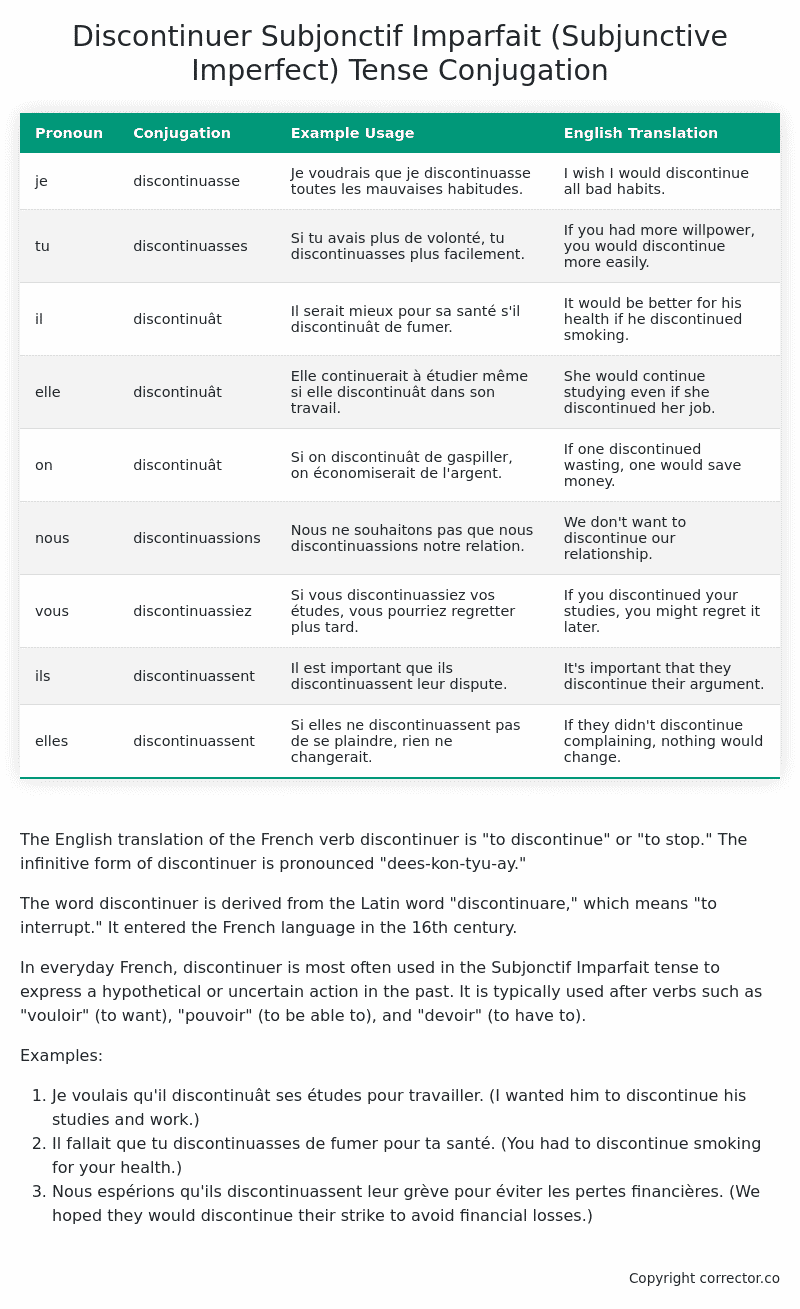Subjonctif Imparfait (Subjunctive Imperfect) Tense Conjugation of the French Verb discontinuer
Introduction to the verb discontinuer
The English translation of the French verb discontinuer is “to discontinue” or “to stop.” The infinitive form of discontinuer is pronounced “dees-kon-tyu-ay.”
The word discontinuer is derived from the Latin word “discontinuare,” which means “to interrupt.” It entered the French language in the 16th century.
In everyday French, discontinuer is most often used in the Subjonctif Imparfait tense to express a hypothetical or uncertain action in the past. It is typically used after verbs such as “vouloir” (to want), “pouvoir” (to be able to), and “devoir” (to have to).
Examples:
- Je voulais qu’il discontinuât ses études pour travailler. (I wanted him to discontinue his studies and work.)
- Il fallait que tu discontinuasses de fumer pour ta santé. (You had to discontinue smoking for your health.)
- Nous espérions qu’ils discontinuassent leur grève pour éviter les pertes financières. (We hoped they would discontinue their strike to avoid financial losses.)
Table of the Subjonctif Imparfait (Subjunctive Imperfect) Tense Conjugation of discontinuer
| Pronoun | Conjugation | Example Usage | English Translation |
|---|---|---|---|
| je | discontinuasse | Je voudrais que je discontinuasse toutes les mauvaises habitudes. | I wish I would discontinue all bad habits. |
| tu | discontinuasses | Si tu avais plus de volonté, tu discontinuasses plus facilement. | If you had more willpower, you would discontinue more easily. |
| il | discontinuât | Il serait mieux pour sa santé s’il discontinuât de fumer. | It would be better for his health if he discontinued smoking. |
| elle | discontinuât | Elle continuerait à étudier même si elle discontinuât dans son travail. | She would continue studying even if she discontinued her job. |
| on | discontinuât | Si on discontinuât de gaspiller, on économiserait de l’argent. | If one discontinued wasting, one would save money. |
| nous | discontinuassions | Nous ne souhaitons pas que nous discontinuassions notre relation. | We don’t want to discontinue our relationship. |
| vous | discontinuassiez | Si vous discontinuassiez vos études, vous pourriez regretter plus tard. | If you discontinued your studies, you might regret it later. |
| ils | discontinuassent | Il est important que ils discontinuassent leur dispute. | It’s important that they discontinue their argument. |
| elles | discontinuassent | Si elles ne discontinuassent pas de se plaindre, rien ne changerait. | If they didn’t discontinue complaining, nothing would change. |
Other Conjugations for Discontinuer.
Le Present (Present Tense) Conjugation of the French Verb discontinuer
Imparfait (Imperfect) Tense Conjugation of the French Verb discontinuer
Passé Simple (Simple Past) Tense Conjugation of the French Verb discontinuer
Passé Composé (Present Perfect) Tense Conjugation of the French Verb discontinuer
Futur Simple (Simple Future) Tense Conjugation of the French Verb discontinuer
Futur Proche (Near Future) Tense Conjugation of the French Verb discontinuer
Plus-que-parfait (Pluperfect) Tense Conjugation of the French Verb discontinuer
Passé Antérieur (Past Anterior) Tense Conjugation of the French Verb discontinuer
Futur Antérieur (Future Anterior) Tense Conjugation of the French Verb discontinuer
Subjonctif Présent (Subjunctive Present) Tense Conjugation of the French Verb discontinuer
Subjonctif Passé (Subjunctive Past) Tense Conjugation of the French Verb discontinuer
Subjonctif Imparfait (Subjunctive Imperfect) Tense Conjugation of the French Verb discontinuer (this article)
Conditionnel Présent (Conditional Present) Tense Conjugation of the French Verb discontinuer
Conditionnel Passé (Conditional Past) Tense Conjugation of the French Verb discontinuer
L’impératif Présent (Imperative Present) Tense Conjugation of the French Verb discontinuer
L’infinitif Présent (Infinitive Present) Tense Conjugation of the French Verb discontinuer
Struggling with French verbs or the language in general? Why not use our free French Grammar Checker – no registration required!
Get a FREE Download Study Sheet of this Conjugation 🔥
Simply right click the image below, click “save image” and get your free reference for the discontinuer Subjonctif Imparfait tense conjugation!

Discontinuer – About the French Subjonctif Imparfait (Subjunctive Imperfect) Tense
Formation
Common Everyday Usage Patterns
Interactions with Other Tenses
Subjonctif Présent
Indicatif Passé Composé
Conditional
Conditional Perfect
Summary
I hope you enjoyed this article on the verb discontinuer. Still in a learning mood? Check out another TOTALLY random French verb conjugation!


